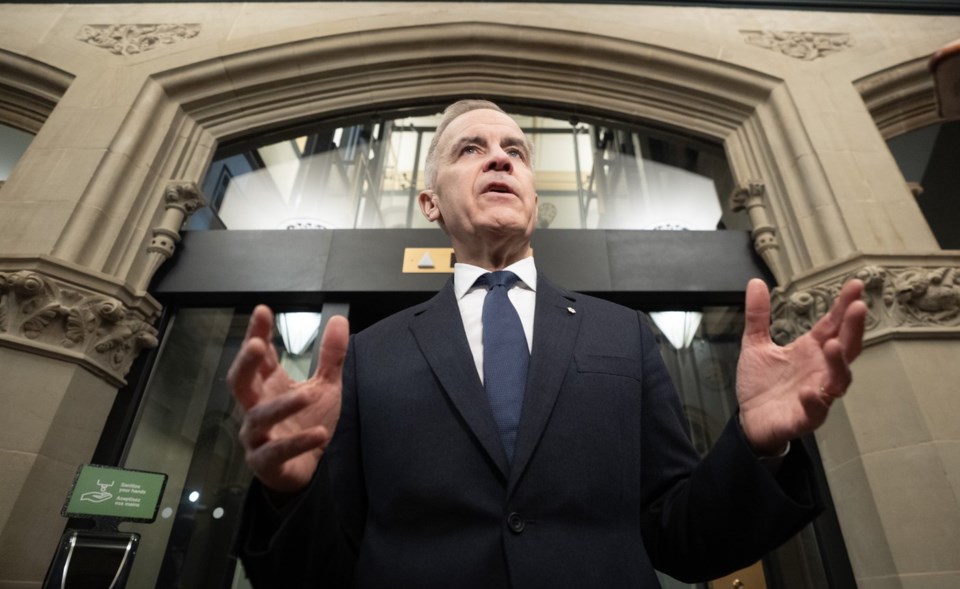Here is a roundup of stories from The Canadian Press designed to bring you up to speed...
Carney back on the campaign trail today
Liberal Leader Mark Carney is back on the road today after making a detour to Ottawa for meetings about U.S. President Donald Trump's latest tariffs.
Carney is expected to be in Montreal today, after meeting virtually with Canada's premiers and sharing a response to the tariffs.
Trump unveiled Wednesday a 10 per cent baseline tariff on imports from most countries and a lengthy list of tariff levels dozens will face, though a White House fact sheet said goods imported under the Canada-U.S.-Mexico Agreement on trade, known as CUSMA, still do not face tariffs.
Trump is also going ahead with previously announced 25 per cent tariffs on automobile imports starting today, which will add to existing 25 per cent tariffs on all steel and aluminum imports into the U.S., including from Canada.
Trump tariffs trigger two-week auto plant shutdown
Donald Trump's trade war is spreading and hitting just about every nation around the globe with "reciprocal tariffs," ranging from 10 to 49 per cent.
And while Canada was excluded from the new list, the effects of other new levies previously announced by the U.S. president are already being felt.
Officials with Unifor Local 444, which represents workers at Stellantis' Windsor Assembly Plant, say they have received notification from the automaker that the facility will be shut down for two weeks, starting April 7.
They admit that the move is not entirely unexpected, but say the company cited Trump's latest tariff announcement on Wednesday afternoon as the primary factor driving the decision.
Rerouting supply chains amid tariffs no easy task
The notion that Canadian companies can simply switch supply chains in response to American tariffs is a fantasy, experts say.
With 25 per cent duties levied on some Canadian goods and the possibility of more tariffs to come, businesses north of the border are looking elsewhere to source their material and sell their products.
But companies caught up in tightly braided supply channels after decades of trade pacts and sector specialization may quickly bump into barriers around everything from transport and labour costs to resource availability, manufacturing capacity and market saturation.
Forestry players face an entirely different dilemma. Lumber exports, while ample, have a low value per volume compared to some other commodities.
'Freedom Convoy' organizers to hear verdict
"Freedom Convoy" organizers Tamara Lich and Chris Barber are set to hear a verdict today in the joint trial over their roles in the mass protest against pandemic health measures that rolled into Ottawa more than three years ago.
Lich and Barber were both charged with mischief, intimidation and counselling others to break the law in relation to their roles in the 2022 protest that drew thousands of demonstrators to Ottawa for three weeks.
Their trial wrapped up in September after hearing 45 days of evidence and legal arguments.
At the time, Justice Heather Perkins-McVey said it would be "daunting" to come up with a verdict, given the volume of evidence and legal arguments involved in the case.
Whale migration may be hampered by climate change
The Canadian lead author of a new study on the migration of humpback whales is sounding the alarm on how climate change could spell trouble for the species.
The report published in the journal Scientific Reports says tracking of 42 whales tagged off the Central and South American coasts showed the animals use long-term memory and sense environmental changes such as sea temperature to determine when to begin their 10,000-kilometre migration to Antarctic feeding grounds every year.
McGill University biologist and associate professor Virginie Millien says ocean warming has caused the whales to adjust their migration in order to catch the peak of the seasonal "bloom" of krill off the Antarctic coast.
Millien says researchers worry that while the whales appear to be adjusting their timing as the sea gets warmer, the pace of climate change may become too fast for the species to "keep up."
---
This report by The Canadian Press was first published April 3, 2025
The Canadian Press



